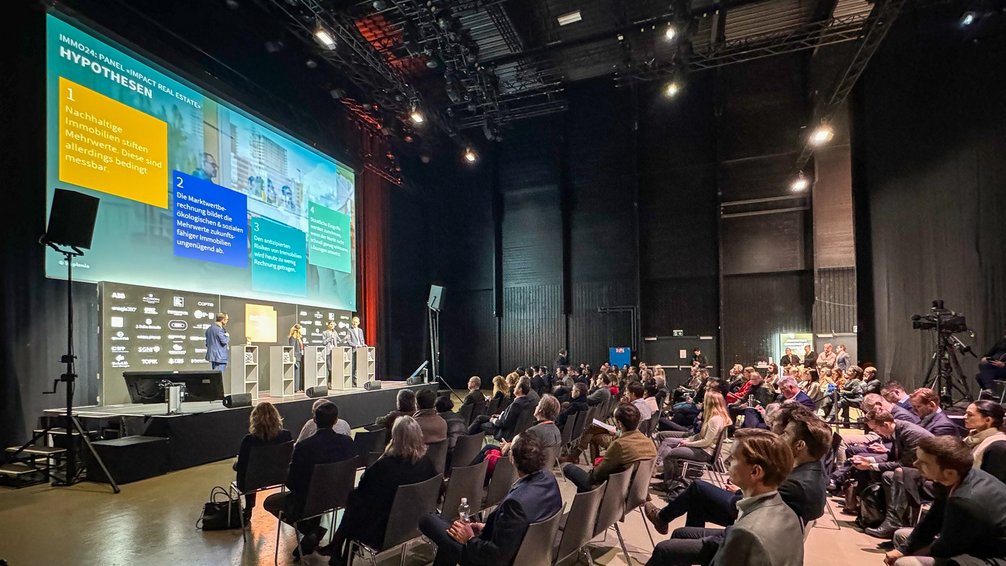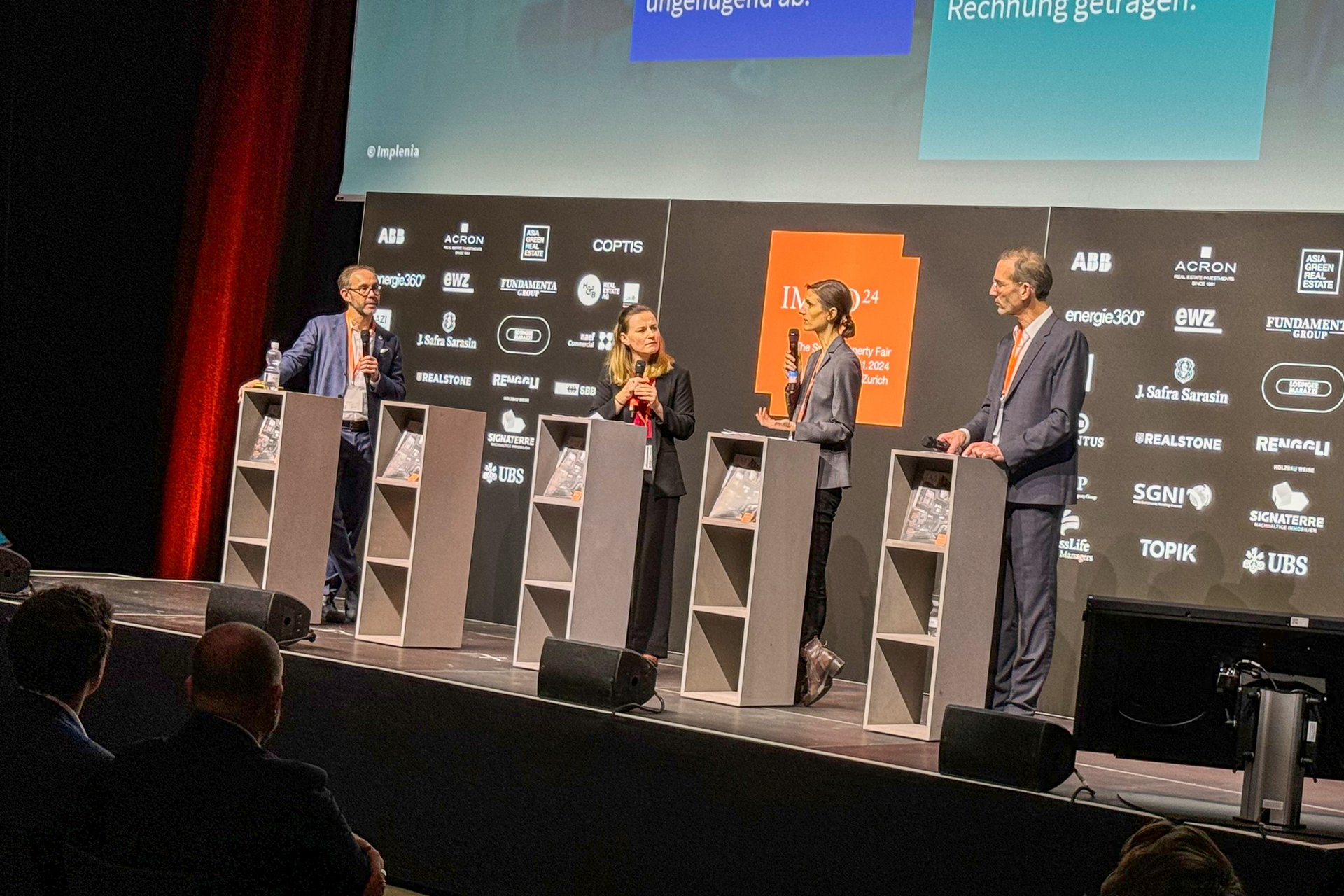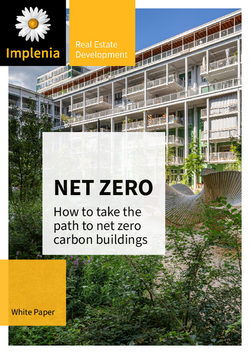"Impact Real Estate": Activating the social and ecological added value of real estate

Hypothesis 1: Sustainable real estate creates added value. However, these can only be measured to a limited extent.
Sustainable real estate can create great added value at all levels. In the social context, the question arises as to what contribution they make to housing supply. It is therefore essential that the apartments fit the social structure and that offers are made available for different budgets and household types. For Joëlle Zimmerli, owner and managing director of Zimraum GmbH, the distribution issue is central: it is not enough to have an ideal housing offer - who these apartments are allocated to is also crucial. With their portfolios, real estate owners have a major leverage effect when it comes to creating social added value - and on a large scale, this can certainly be measured.
At the ecological level, the focus is on achieving a net-zero balance over the entire life cycle. The construction industry in particular still faces numerous challenges here, for example with regard to construction energy and building materials. Anne Caminade, Project Manager at Lemon Consult, sees the "holy grail" in closed material cycles. Energy self-sufficient properties and the use of solar power and other locally available renewable energy sources also hold great potential when it comes to achieving independence from global or energy policy fluctuations. Another important factor is adaptability: sustainable properties must be planned and developed in such a way that they can react to changing conditions and demand situations.
Stefan Meier, Partner at Wüest Partner, is convinced that sustainable real estate projects that are developed according to net-zero principles are already attractive from an economic perspective, especially when it comes to operating emissions: "The invested franc pays off." The issue of the future is gray emissions. However, the balancing act between costs and benefits is becoming more pronounced: "If you consistently pay attention to minimizing grey energy emissions during development, you can, for example, avoid large basement floors, large areas of glazing and optimize the building structure. The choice of suitable building materials and transportation routes are also crucial," says Stefan Meier. At the same time, it is already paying off today to upgrade existing portfolios in terms of energy efficiency for the future: Converting to heat pumps or optimizing insulation, for example, are measures that can be directly profitable.
Hypothesis 2: The market value calculations do not adequately reflect the ecological and social added value of sustainable real estate.
In general, it has become more difficult to sell non-sustainable properties: Institutional investors avoid such properties due to the associated risks. However, according to Joëlle Zimmerli, it is not a solution to sell stranded assets from the portfolios; instead, active improvement of the portfolio should be rewarded in the valuations. Implenia has an impressive track record in the management and transformation of properties "from brown to green" and is examining the acquisition of such properties for its own portfolio.
Joelle Zimmerli also hypothesizes that there can be no stranded assets when it comes to social sustainability, because social benefits can be derived from any property. The space program determines what can happen in a property and what rental prices can be achieved. A prerequisite for the best possible focus on social sustainability aspects is that the owners are integrated into the development processes as early as possible with their strategy, for example with regard to target groups and management, so that the social and ecological performance of the properties can be optimized in the long term.
In an ecological context, new approaches such as "cradle-to-cradle" or "design for disassembly" offer great opportunities to minimize construction waste and thus disposal costs. A change in mindset and greater transparency in the construction industry can make a significant contribution to ensuring that the costs of a property can be considered and reduced over several generations.
Hypothesis 3: Too little account is currently taken of the anticipated risks of real estate.
Stefan Meier notes that investors are not yet taking sufficient account of investment risks in relation to sustainability. We need to take a closer look at future risks (for example with regard to dismantling or CO2 compensation payments) and differentiate them better and more strongly, as these will have a decisive impact on future willingness to pay. From a social perspective, it would also be exciting to take forecast changes in demand into account in valuations and, for example, to better value portfolios that serve an expected supply gap – although this is likely to be difficult given the highly dynamic nature of the real estate market.
Hypothesis 4: Government intervention will increase if the market does not implement effective solutions quickly enough.
Impending regulations, if they have not already been implemented, should be incentive enough for the real estate industry to quickly and consistently provide future-oriented solutions that are not only economically, but also socially and ecologically convincing. One of the major challenges is to mobilize private owners to implement more environmental and social aspects in their properties. There are currently still major differences between institutional and private investors when it comes to their implementation.
A key issue remains the housing shortage and the housing supply, which should include a certain variance in unit prices so that a balanced supply can be created for different budgets and household types. In this respect, there is still great potential for improvement – within the context of economic efficiency. The same applies to decarbonization: although the real estate and construction industry has already made great progress, the goal is only partially in sight. We need to rethink buildings with a view to future generations, taking into account renovation and conversion scenarios, and real estate projects need to be developed and implemented with this foresight today.
The biggest challenge lies in decarbonization: given the scarcity of resources (experts, know-how and materials), it currently seems unlikely that the Paris Agreement targets can be achieved by 2050 – it remains a race against time. With its comprehensive, integrated range of services and deep sustainability expertise, Implenia is well positioned to help owners make their assets and portfolios fit for the future.
The whole conversation:
Conclusion
Real estate that takes future ecological and social needs into account must also pay off financially. This approach is crucial for future development and the real estate industry's contribution to achieving global sustainability goals. "We are convinced that sustainable real estate development is not only an obligation, but also a valuable investment in the future," says Marc Lyon. In recent years, Implenia has built up significant expertise in the development of sustainable real estate and is committed to an ambitious decarbonization strategy. Implenia thus accompanies its customers on the way to a CO2-neutral portfolio and supports them in implementing sustainable solutions and integrating the activation of ecological and social added value into the financial valuation of real estate.
More about Real Estate Developpement
Your contact

Alternatively, the business card is available for download. Download VCF-Card
White Paper Net Null
The path to CO2-neutral buildings
The exponential rise in anthropogenic greenhouse gas concentrations since industrialization has led to an increased greenhouse effect. This is causing irreversible damage to natural ecosystems and to our society. Mitigation and adaptation measures are crucial for the preservation of livelihoods and intergenerational equity.
Our research and the resulting white paper on decarbonization provide you with all the necessary insights and information on this forward-looking and relevant topic. The data basis of the white paper consists of a broad-based portfolio study of 36 Implenia development projects based on SIA 2040, which was carried out in 2022.









Comments (0)
No comments found.